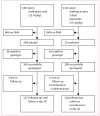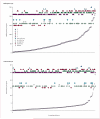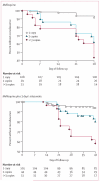Mefloquine resistance in Plasmodium falciparum and increased pfmdr1 gene copy number
- PMID: 15288742
- PMCID: PMC4337987
- DOI: 10.1016/S0140-6736(04)16767-6
Mefloquine resistance in Plasmodium falciparum and increased pfmdr1 gene copy number
Abstract
Background: The borders of Thailand harbour the world's most multidrug resistant Plasmodium falciparum parasites. In 1984 mefloquine was introduced as treatment for uncomplicated falciparum malaria, but substantial resistance developed within 6 years. A combination of artesunate with mefloquine now cures more than 95% of acute infections. For both treatment regimens, the underlying mechanisms of resistance are not known.
Methods: The relation between polymorphisms in the P falciparum multidrug resistant gene 1 (pfmdr1) and the in-vitro and in-vivo responses to mefloquine were assessed in 618 samples from patients with falciparum malaria studied prospectively over 12 years. pfmdr1 copy number was assessed by a robust real-time PCR assay. Single nucleotide polymorphisms of pfmdr1, P falciparum chloroquine resistance transporter gene (pfcrt) and P falciparum Ca2+ ATPase gene (pfATP6) were assessed by PCR-restriction fragment length polymorphism.
Findings: Increased copy number of pfmdr1 was the most important determinant of in-vitro and in-vivo resistance to mefloquine, and also to reduced artesunate sensitivity in vitro. In a Cox regression model with control for known confounders, increased pfmdr1 copy number was associated with an attributable hazard ratio (AHR) for treatment failure of 6.3 (95% CI 2.9-13.8, p<0.001) after mefloquine monotherapy and 5.4 (2.0-14.6, p=0.001) after artesunate-mefloquine therapy. Single nucleotide polymorphisms in pfmdr1 were associated with increased mefloquine susceptibility in vitro, but not in vivo.
Interpretation: Amplification in pfmdr1 is the main cause of resistance to mefloquine in falciparum malaria.
Relevance to practice: Multidrug resistant P falciparum malaria is common in southeast Asia, but difficult to identify and treat. Genes that encode parasite transport proteins maybe involved in export of drugs and so cause resistance. In this study we show that increase in copy number of pfmdr1, a gene encoding a parasite transport protein, is the best overall predictor of treatment failure with mefloquine. Increase in pfmdr1 copy number predicts failure even after chemotherapy with the highly effective combination of mefloquine and 3 days' artesunate. Monitoring of pfmdr1 copy number will be useful in epidemiological surveys of drug resistance in P falciparum, and potentially for predicting treatment failure in individual patients.
Figures



Similar articles
-
Pfmdr1 copy number and arteminisin derivatives combination therapy failure in falciparum malaria in Cambodia.Malar J. 2009 Jan 12;8:11. doi: 10.1186/1475-2875-8-11. Malar J. 2009. PMID: 19138391 Free PMC article.
-
Molecular analysis of pfatp6 and pfmdr1 polymorphisms and their association with in vitro sensitivity in Plasmodium falciparum isolates from the Thai-Myanmar border.Acta Trop. 2011 Oct-Nov;120(1-2):130-5. doi: 10.1016/j.actatropica.2011.07.003. Epub 2011 Jul 13. Acta Trop. 2011. PMID: 21777558
-
Monitoring of in vitro susceptibilities and molecular markers of resistance of Plasmodium falciparum isolates from Thai-Myanmar border to chloroquine, quinine, mefloquine and artesunate.Acta Trop. 2010 Feb;113(2):190-4. doi: 10.1016/j.actatropica.2009.10.016. Epub 2009 Oct 30. Acta Trop. 2010. PMID: 19879850
-
Antimalarial drugs: recent advances in molecular determinants of resistance and their clinical significance.Cell Mol Life Sci. 2006 Jul;63(14):1586-96. doi: 10.1007/s00018-006-6071-1. Cell Mol Life Sci. 2006. PMID: 16699808 Free PMC article. Review.
-
Antimalarial multi-drug resistance in Asia: mechanisms and assessment.Curr Top Microbiol Immunol. 2005;295:39-53. doi: 10.1007/3-540-29088-5_2. Curr Top Microbiol Immunol. 2005. PMID: 16265886 Review.
Cited by
-
Plasmodium falciparum resistance to ACTs: Emergence, mechanisms, and outlook.Int J Parasitol Drugs Drug Resist. 2021 Aug;16:102-118. doi: 10.1016/j.ijpddr.2021.05.007. Epub 2021 May 26. Int J Parasitol Drugs Drug Resist. 2021. PMID: 34090067 Free PMC article.
-
Molecular monitoring of Plasmodium falciparum drug susceptibility at the time of the introduction of artemisinin-based combination therapy in Yaoundé, Cameroon: implications for the future.Malar J. 2012 Apr 12;11:113. doi: 10.1186/1475-2875-11-113. Malar J. 2012. PMID: 22498364 Free PMC article.
-
Analysis of P-glycoprotein expression in purified parasite plasma membrane and food vacuole from Plasmodium falciparum.Parasitol Res. 2006 Nov;99(6):631-7. doi: 10.1007/s00436-006-0209-9. Epub 2006 May 19. Parasitol Res. 2006. PMID: 16710674
-
No variation in the prevalence of point mutations in the Pfcrt and Pfmdr1 genes in isolates from Gabonese patients with uncomplicated or severe Plasmodium falciparum malaria.Parasitol Res. 2007 Feb;100(3):487-93. doi: 10.1007/s00436-006-0287-8. Epub 2006 Oct 28. Parasitol Res. 2007. PMID: 17096149
-
High-level artemisinin-resistance with quinine co-resistance emerges in P. falciparum malaria under in vivo artesunate pressure.BMC Med. 2018 Oct 1;16(1):181. doi: 10.1186/s12916-018-1156-x. BMC Med. 2018. PMID: 30269689 Free PMC article.
References
-
- Korenromp EL, Williams BG, Gouws E, Dye C, Snow RW. Measurement of trends in childhood malaria mortality in Africa: an assessment of progress toward targets based on verbal autopsy. Lancet Infect Dis. 2003;3:349–58. - PubMed
-
- Plowe CV. Folate antagonists and mechanisms of resistance. In: Rosenthal PJ, editor. Antimalarial chemotherapy. Humana Press; Totowa: 2001. pp. 173–90.
-
- Vaidya AB. Atovaquone-proguanil combination. In: Rosenthal PJ, editor. Antimalarial chemotherapy. Humana Press; Totowa: 2001. p. 396.
-
- Djimde A, Doumbo OK, Cortese JF, et al. A molecular marker for chloroquine-resistant falciparum malaria. N Engl J Med. 2001;344:257–63. - PubMed
Publication types
MeSH terms
Substances
Grants and funding
LinkOut - more resources
Full Text Sources
Other Literature Sources
Medical
Miscellaneous

